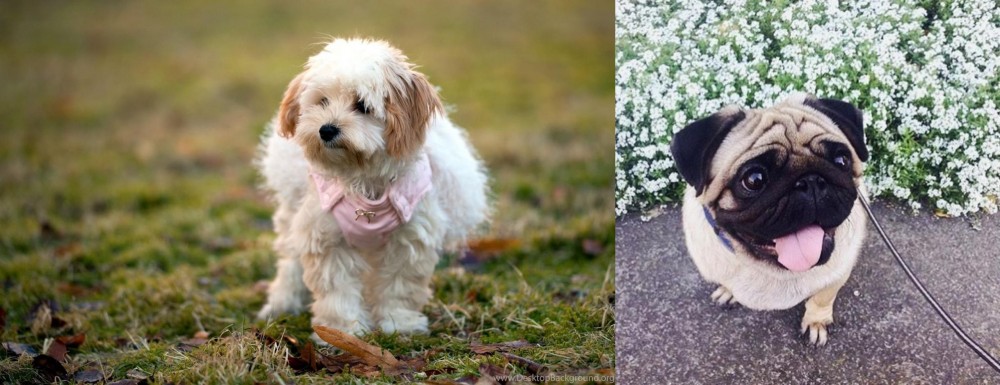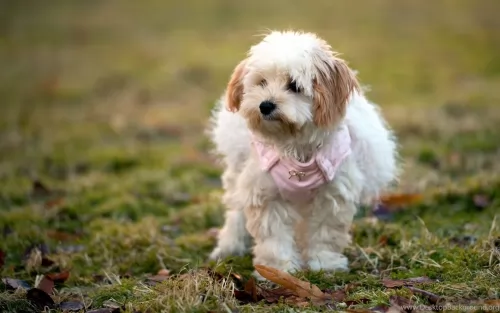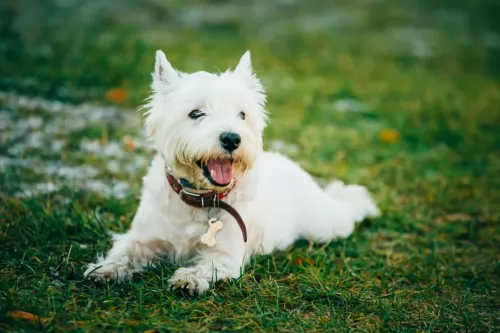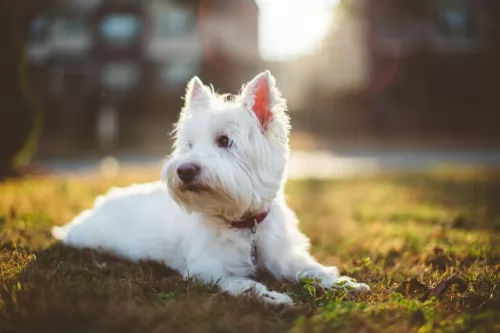 Petzlover
Petzlover West Highland White Terrier is originated from United Kingdom but Pug is originated from China. West Highland White Terrier may grow 6 cm / 2 inches shorter than Pug. Both West Highland White Terrier and Pug are having almost same weight. Both West Highland White Terrier and Pug has almost same life span. Both West Highland White Terrier and Pug has almost same litter size. West Highland White Terrier requires High Maintenance. But Pug requires Low Maintenance
West Highland White Terrier is originated from United Kingdom but Pug is originated from China. West Highland White Terrier may grow 6 cm / 2 inches shorter than Pug. Both West Highland White Terrier and Pug are having almost same weight. Both West Highland White Terrier and Pug has almost same life span. Both West Highland White Terrier and Pug has almost same litter size. West Highland White Terrier requires High Maintenance. But Pug requires Low Maintenance
 The West highland white terrier originated from Poltalloch in Scotland. So they were initially called as Poltalloch terrier and after that they were called as Roseneath terrier. They were initially used for hunting fox, badger, otter and in killing the vermin like rats.
The West highland white terrier originated from Poltalloch in Scotland. So they were initially called as Poltalloch terrier and after that they were called as Roseneath terrier. They were initially used for hunting fox, badger, otter and in killing the vermin like rats.
The breed history says that Colonel Malcolm of Poltalloch was the reason for the Westie's white colour. This is because in 19th centuryhe went for hunting with his dogs and accidentally he shot his dog as its colour was as fox. So he decided to breed only white colour dogs.
 It is believed that Pugs originated in China, but not much is known about the early history of these dogs. There are some dog experts who believe that the dogs were brought to Holland by Portuguese traders in the 16th century.
It is believed that Pugs originated in China, but not much is known about the early history of these dogs. There are some dog experts who believe that the dogs were brought to Holland by Portuguese traders in the 16th century.
These dogs then went from Holland to England in 1689. The American Kennel Club registered the Pugs in 1885.
In 1931, the Pug Dog Club of America was established.
 The Westie can be said as that a small dog having the talents of the big dog. They are very popular for their obedience. They are also working as therapy dogs and also some in search and rescue teams. The home having Westie will have fun always and be enthusiastic. They will suit them for country or city living, but they like to live with their family. They are well suitable for apartment living, but some training should be given to them for not barking. They can stay in home when you are at work. Westie can be taken to travel, whether it may be long vacation or a short visit.
The Westie can be said as that a small dog having the talents of the big dog. They are very popular for their obedience. They are also working as therapy dogs and also some in search and rescue teams. The home having Westie will have fun always and be enthusiastic. They will suit them for country or city living, but they like to live with their family. They are well suitable for apartment living, but some training should be given to them for not barking. They can stay in home when you are at work. Westie can be taken to travel, whether it may be long vacation or a short visit.
They are quick learners and so training them is not difficult. Mistakes of them can be corrected patiently since they don't like harsh activities against them. Westie will definitely bark when he sees something or hear different sounds. He will bark on seeing visitors or even other dogs. Sometimes they will bark for very silly things but when given appropriate training in their young stage, they can bark only for alerts.
 Pugs are small dogs standing at roughly 25cm and 36cm in height and weighing between 6 and 8.5kg. They are categorized as a toy breed.
Pugs are small dogs standing at roughly 25cm and 36cm in height and weighing between 6 and 8.5kg. They are categorized as a toy breed.
The head is large in size compared to the body. It’s the eyes which are quite distinct – being particularly large and prominent, almost bulging. The face is fairly wrinkled too with the muzzle being short or blunt and black in color.
The coat of the dog is smooth and short with colors mainly being fawn, but black is also seen. The ears are medium sized and floppy while the tail curls up tightly over the back.
The Pug is unusual to look at and also has an unusual personality. He is an entertaining dog with his clownish antics but he happens to be intelligent too, and will respond well to training and socialization.
With their short coats they are regarded as low-maintenance dogs, although the short, double coat does shed quite a bit. They’re also not your typical live-wire and can quite easily be found lounging around.
Of course they can’t be left to do this too often as obesity can easily set it. Pugs will certainly need some physical exercise and mental stimulation. They’re playful dogs and get on well with children and other pets, especially if there are games to be enjoyed.
They are loyal, affectionate pets with their human owners and make a good pet for those living in the city or in the countryside.
 The Westie is friendly with children but not all the time. So some care should be taken while they are near children.
The Westie is friendly with children but not all the time. So some care should be taken while they are near children.
They like to chase rodents like rabbits as they are interested in hunting.
They are suitable for apartment living unless they are left alone for a very long time. They love cold weather more than hot.
They can be trained by giving some extra efforts.
 The Pug just loves spending time with his human family. They’re good with other dogs too and with children.
The Pug just loves spending time with his human family. They’re good with other dogs too and with children.
They’re even tempered and will make anyone a splendid family pet, so long as they’re not heavy into things like jogging and cycling.
He is alert and can make you a good watchdog. With all the love he comes with, the comical Pug can make you a most wonderful pet and friend.
 Every dog, regardless of breed, can develop health problems. Good nutrition, exercise and love and care go a long way to ward off diseases and ensure your pet has a healthy, happy life.
Every dog, regardless of breed, can develop health problems. Good nutrition, exercise and love and care go a long way to ward off diseases and ensure your pet has a healthy, happy life.
The Pug can also develop certain health problems and we look at one or two -
This is inflammation of the brain and it causes seizures. Unfortunately there isn’t a cure. This neurological disease is luckily rare. Usually it attacks young Pugs of 2 or 3 years of age. Seizures, neck stiffness, loss of co-ordination, lethargy are all signs of this disease.
Sad though it may be, the best way forward would be to put your dog to sleep, but in any case your vet will discuss all options with you.
With this disease, your Pug can have breathing problems, which can be aggravated if the Pug is overweight or the weather particularly hot. Don’t exercise your Pug too vigorously on a hot day.
Stenoic nares is a medical term for narrow nostrils in a dog, and this is precisely what the Pug battles with. If the Pug battles too much with breathing problems, corrective surgery is possible.
Pugs often have to contend with some serious dental problems, and this is because their teeth are crowded. He may require more dental attention than other dogs.
 The puppy should be fed 3 to 4 times per day as it requires a considerable amount for their growth. Cooked chicken breast and turkey are best for them and also vegetables should be given to them. Beef and chicken should be kept a limit as it will lead to itchy skin and allergies.
The puppy should be fed 3 to 4 times per day as it requires a considerable amount for their growth. Cooked chicken breast and turkey are best for them and also vegetables should be given to them. Beef and chicken should be kept a limit as it will lead to itchy skin and allergies.
The preferable food for the Westie is home cooked. The home food will only contain all the essential nutrients for the Westie.
Eventhough the Westie is suitable for apartment living it is recommended to have a daily walk for him to be active and refreshing.
They should be made to play for atleast 30 minutes per day for their health as to not gain overweight. Grown up children can play with them as they like it.
 Grooming your Pug’s coat will simply require a brush twice a week. They’re fairly heavy shedders these Pugs so you can’t neglect the brushing.
Grooming your Pug’s coat will simply require a brush twice a week. They’re fairly heavy shedders these Pugs so you can’t neglect the brushing.
It’s your chance to check the inside of his ears for signs of redness and to also check that his eyes are alright. You’ll also need a damp cloth to wipe his face and get rid of debris caught in the wrinkles. Run your hands over his body and make sure there aren’t any unusual new lumps. Keep his nails trimmed too.
Your Pug will need the best food there is to give his health the best chance. Remember that if you buy commercially manufactured dog food, to buy the very best one there is. Some of the poorer quality ones don’t come with the right balance of vitamins and minerals, and they also have lots of bad colorants and preservatives.
Also, be careful to read the packaging. Your Pug is a toy breed so you can’t be buying him food for large breed dogs such as Mastiffs or German Shepherds.
Consistency and simplicity is what your Pug wants from you. Home-made food is always an excellent choice for your pet’s diet. Boiled chicken, brown rice or pasta and spinach, sweet potatoes and carrots can be very healthy for him. For your Pug, chop it all up and maybe twice a week add it into the dry kibble.
Some raw meat added in occasionally will also ensure his good health. Always make sure he has access to fresh, cool water.